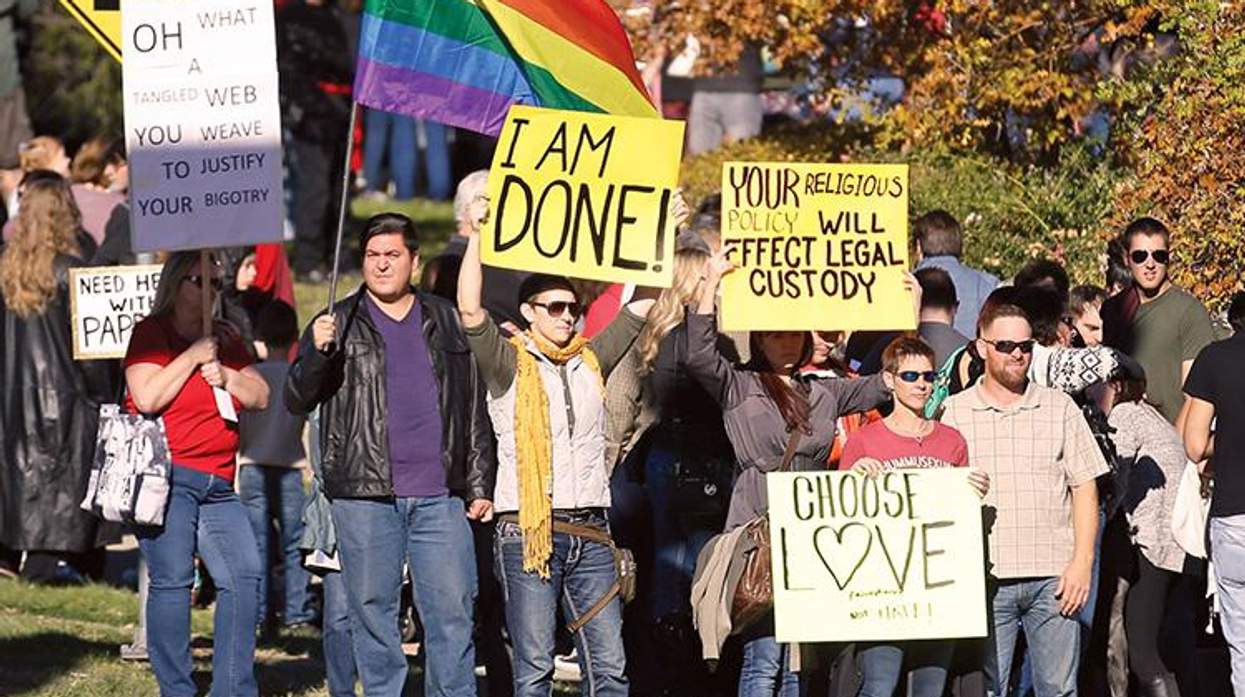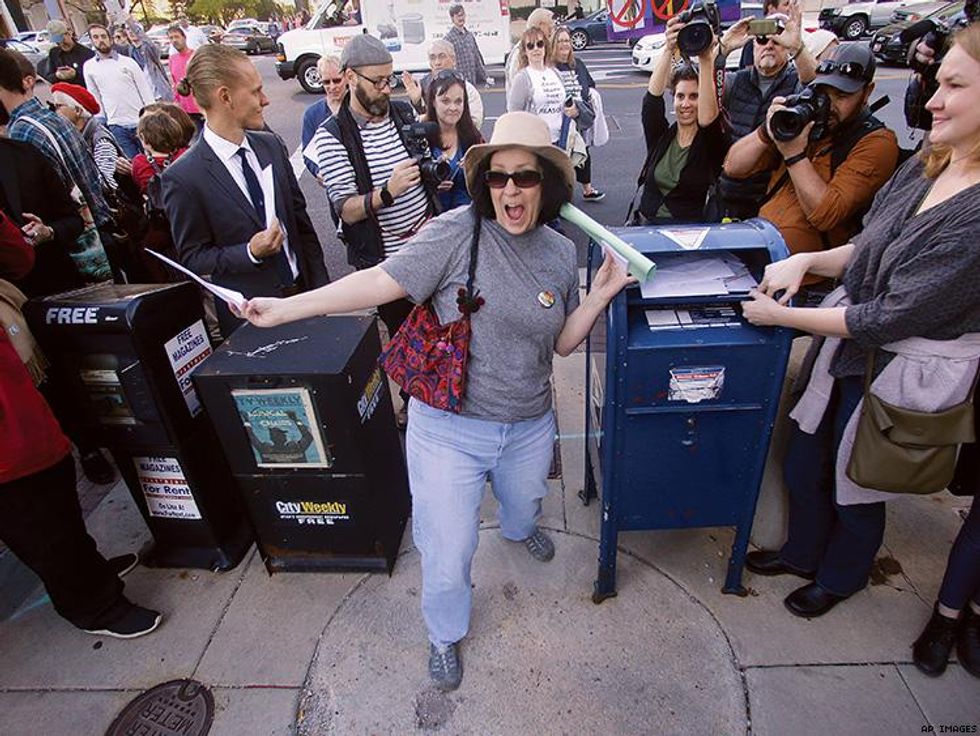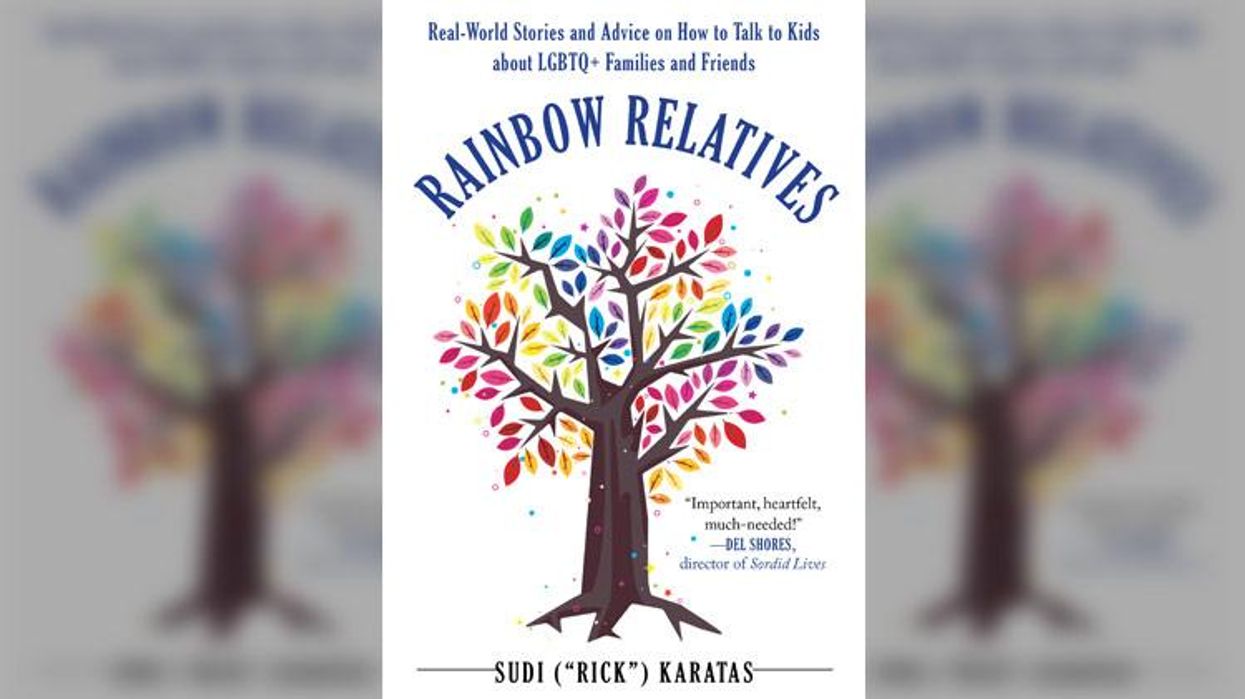Karen Paglio arrived at the mass resignation early, clutching a sealed envelope addressed to the records department of the Church of Jesus Christ of Latter-day Saints.
"This policy was the last straw for me," she says, referring to a new provision in the LDS Handbook introduced on November 3, 2015, that bars children of same-sex couples from joining the church or being blessed or baptized until and unless they turn 18, move out of their parents' home, and disavow all same-sex relationships. "I also included a personal letter to let the records department know how I felt about the policy and its effects on the community."
The slippery-slope argument against same-sex marriage, that it will inevitably lead to polygamy, bestiality, incest, etc., has long been cited by opponents. Polygamy-as-cautionary-tale is being employed again -- ironically, this time, by elders in the Mormon Church -- to defend the new
provision.
"For generations, we've had these same kinds of policies that relate to children in polygamous families," explained David Todd Christofferson, one of the church's highest administrative and ecclesiastical authorities, in a video released by the church on November 6. He explained that children raised in polygamous households who want to go on a proselytizing mission must first disavow the practice. "We think it's possible, and mandatory, incumbent upon us as disciples of the Lord Jesus Christ to yield no ground [...] maintaining the standards he maintained."
Lauren Elise McNamara yielded less ground maintaining her own standards when she learned about the policy, which was leaked to social media on the evening of November 5.
"You can really judge the Christianity of an organization by how easy or hard it is to leave," says McNamara, who immediately engaged with Mormon and ex-Mormon online forums. "Everyone was posting similar messages, using similar expletives. I jokingly wrote, 'Maybe it's time for another mass resignation.' The response was immediate and definitive. So I created a Facebook event and went to sleep. When I woke up, it had over 2,000 RSVPs."
Nine days later, on November 14, across the street from the LDS church's international headquarters in downtown Salt Lake City, thousands of soon-to-be former Mormons from 20 states and multiple countries gathered -- some with resignation envelopes already signed and sealed, others planning to complete them with assistance from Mark Naugle, a 30-year-old immigration attorney on-site offering his services pro bono. Naugle, who left the church with his family when he was 15, explained that doing so can be as cumbersome logistically as it is emotionally.
"You start receiving what can only be described as harassment from your
community, your family, and everyone you know," Naugle says. "The church sends local ecclesiastical leaders to attempt to sway you back into the fold. I don't think they do it maliciously, necessarily. They feel that your eternal salvation is on the line. It is not an easy thing to escape from. But when you use an attorney [to submit the
resignation], you receive no contact and your resignation is usually processed within a couple of weeks."
Naugle says he personally mailed 3,200 resignation letters to the LDS records department, including 1,300 from the November 14 event and more than 1,900 he's received via fax, mail, and email since the policy announcement.
"I have helped people all over the world: New Zealand, Australia, U.K.,
Germany, South Korea, Japan, India, France, and Scotland," Naugle says. "I just want to help as many people escape as I can. If you would like, I'll even buy you your first beer."
Above: A woman celebrates before mailing her resignation letter on November 18, 2015.
Excommunicated
Donald Braegger resigned earlier this year, after raising his hand in formal opposition at the semi-annual LDS General Conference in April. Votes of dissent are exceedingly rare; there had been none since 1982, when hands were raised in protest of the church's opposition to the Equal Rights Amendment.
Braegger was directed to meet with his local stake president, the head of a regional group of congregations. "He pleaded with me not to take my name off the record of the church. I then disclosed to him that I was a gay man and was actively sexual with other men. He paused, then said, 'Well, we'll have to hold a disciplinary council on you, and you will likely be excommunicated.' I decided to resign rather than endure that."
Six months later at the mass resignation, in the shadows of the LDS Temple, Braegger addressed thousands of fellow defectors.
"Trust your own sense of what is right and wrong," he urged. "I promise that the feelings of inspiration which you have previously assigned to the Holy Ghost will not abandon you now that you are no longer a member. The church does not have exclusive rights to that, as you have been taught. That spark of the unexplainable, the divine, is an innate part of each of us. And it is the collective power of that divinity that gives even this not-so-small group of committed individuals power to change the world."
It's OK. You are loved. You can go.
"The policy change was a breaking point for my wife and me," explains Sage Turk, a 33-year-old straight married father of two and lifelong member of the LDS Church. He and his wife attended the event with a dozen like-minded friends and family they had mobilized on social media. Turk recorded more than 40 interviews at the event, the audio of which can be found on the Infants on Thrones podcast, and a documentary is currently in the works.
"The Mormon Church is historically very good at both dismissing and punishing any form of dissent," he explains. "Since our own advocacy had come from simply taking the time to listen to the stories of real gay individuals and their families, I figured I could pay it back by capturing the stories of as many allies as I could -- folks who were willing to forgo one of the most important influences in their lives for a righteous cause."
Turk concluded each interview by asking people to look into his camera and repeat a simple phrase, the inspiration for which he explains came on a nightly jog shortly after he decided to resign.
"Tears were pouring down my face," he recalls. "I was so hurt and angry but also so conflicted. But then, clear as a bell, a thought came into my head. Maybe it was my Mormon upbringing and the tendency to seek approval by authority, but the thought of giving myself permission to leave -- to do what I knew I had to do -- was so liberating. I kept repeating it over and over in my mind, then aloud. Before long, I was shouting it into the night air:
"It's OK. You are loved. You can go."
For more from C. Brian Smith: www.cbriansmith.com
















Charlie Kirk DID say stoning gay people was the 'perfect law' — and these other heinous quotes
These are some of his worst comments about LGBTQ+ people made by Charlie Kirk.